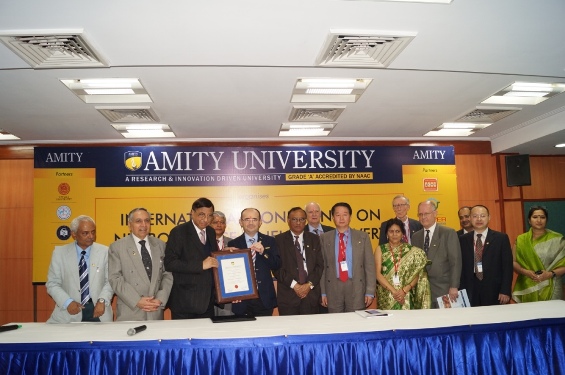04 Mar 2014|Noida | Amity University Campus, Sector-125 Noida
Amity University organises a day long Conference on “Neuroscience and Neurorecovery”

Amity University organized a day long Conference on “Neuroscience and Neurorecovery” at Amity Campus, Sector- 125, Noida
The Conference aimed at promoting better understanding of the complexity of Nervous system and develop better treatment modalities in the field of neurosciences through concerned joint efforts.
During the Conference, International Scientists and Researchers including Prof Chen Lin- Vice Director, Division of Stroke and ICU, Department of Neurosurgery, Tsinghua University Yuquan Hospital, China; Prof Huangyun- Chairman, Department of Neurosurgery, Beijing Rehabilitation Hospital, China; Dr Stephen D Skapper- Department of Pharmaceutical and Pharmacological Sciences, University of Padua, Italy; Dr. Dafin F. Muresanu- Chairman, Department of Clinical Neurosciences, University of Medicine and Pharmacy, Romania; Dr Russel J. Andrews- Ames Associate (Smart Systems and Nanotechnology ), NASA, USA and Dr. Lars Wilkund- Professor of Anaesthesiology and Intensive Care and Chairman, Department of Anaesthesiology, Uppsala University, Sweden presented their research papers on various sub-themes of the Conference.
Also present during the occasion were Dr. Ashok K Chauhan- Founder President, Amity Group, Dr. Aruna Sharma from Uppsala University, Sweden and Convener of the Conference and Dr. Hari Shankar Sharma from Uppsala University, Sweden and Coordinator of the Conference.
Welcoming the distinguished gathering, Dr. W Selvamurthy- President, Amity Science, Technology and Innovation Foundation, Amity University said that nervous system is very complex and needs to be understood and expressed his hope that the Conference will turn out to be an intellectually enriching experience for speakers as well as delegates, leading to globally iconic flagship projects in the area of Neurodisorders.
Presenting a paper on “Clinical Progress, opportunity and challenge of cell therapy in Neurorestoratology”, Prof Huangyun from Beijing, China stated that Neurorestoratology is a new and emerging distinct discipline which states that nerve damage to the central nervous system (CNS) can be restored. Referring to The Beijing Declaration of International Association of Neurorestoratology (IANR), Prof. Huangyun remarked “the aim of Neurorestoratology is to restore or promote recovery of damaged or lost neuronal functions.” He stressed that Neurorestoration is a centre point of multiple disciplines such as Neurology, Neurosurgery, Neurorehabilitation, Neuropharmacology, Orthopedics, Pediatrics, Opthalmology, Urology, Psychology and related areas. He stressed that although current neurorestorative strategies such as cell therapy, neurostimulation, neuroprosthesis or related advanced assistive devices, bioengineering or tissue engineering and other novel treatment procedures could help patients with intractable CNS damage or disease but the recovery is limited, partial or moderate depending upon the cases. He added that cell therapy is the most important strategy in Neurestoratology which has been extensively used to treat neurological disorders and improve patients’ neurological functions and quality of life.
He called upon the Physicians and Scientists to work closer so that the patients are able to benefit from new methods that show or promote neurorestorative effect in the shortest time possible at the bedside.
Dr Stephen D Skapper- Department of Pharmaceutical and Pharmacological Sciences, University of Padua, Italy shared his views on “Mast Cells, Glia and Neuroinflammation: It takes two to tangle” wherein he shared that an extensive communication exists between the immune system and the central nervous system (CNS), as corroborated by recent advances in Neuroscience. Human brain has numerous interwoven glial cells which continuously regulate the brain functions. Glia and Microglia in particular, play key roles in CNS disorders and is reflected through neuropathic pain, epilepsy or other neurodegenerative diseases. During his talk, Dr. Skapper provided an overview of recent progress related to pathobiology of neuroinflammation, the role of microglia, neuro immune interactions involving mat cells and the possibility that mast cell-microglia cross talk may contribute to the exacerbation of acute symptoms of chronic neurodegenerative diseases.
Dr. Dafin F. Muresanu- Chairman, Department of Clinical Neurosciences, University of Medicine and Pharmacy, Romania was felicitated with Honorary Professorship at Amity Institute of Neurosciences for the immense research work he has been doing in the area of Neurosciences.
Dr. Ashok K Chauhan- Founder President, Amity Group announced the launch of “Amity International Foundation for Neurosciences” which will provide an apt platform to International experts in the field of Neurosciences to discuss and deliberate upon the topical advances in Neurosciences and collaborate mutually leading to produce break through research in Neurosciences.
During the occasion, the formation of the Consortium “Amity- Sweden, US, China, Romania and Italy” was also announced for promoting brain research globally through concerted efforts.
Various collaborative options proposed during the Conference included joint research projects in the area of Nanomedicine and Herbal Medicines, faculty exchange, student exchange and virtual lectures.
Dr. Lars Wilkund- Professor of Anaesthesiology and Intensive Care and Chairman, Department of Anaesthesiology, Uppsala University, Sweden presented his research paper on “Neuroprotective effect of methylene blue administered during experimental cardiopulmonary resuscitation in piglets”, Dr. Dafin F. Muresanu- Chairman, Department of Clinical Neurosciences, University of Medicine and Pharmacy, Romania on “Mechanism based treatment in Brain protection and recovery- the role of comorbidities” and Dr Russel J. Andrews- Ames Associate (Smart Systems and Nanotechnology ), NASA, USA on “Future Neuromodulation: Beyond Deep Brain Stimulation”